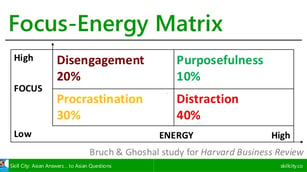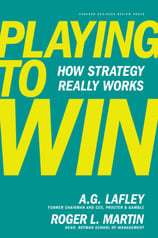In The Coaching Habit: Say Less, Ask More & Change the Way You Lead Forever, author Michael Bungay Staniera shares  2002 Harvard Business Review article, “Beware the Busy Manager,” Heike Bruch and Sumantra Ghoshal. The research suggests only 10 percent of managers have the right focus and energy to work on the stuff that matters.
2002 Harvard Business Review article, “Beware the Busy Manager,” Heike Bruch and Sumantra Ghoshal. The research suggests only 10 percent of managers have the right focus and energy to work on the stuff that matters.
Michael Bungay Staniera offers, “10 percent sounds high to me!”
He continues, “..you can think of someone in your organization who seems to be able to “hold the line” and stop that aggregation of small tasks and additional responsibilities that, for the rest of us, eventually consume our lives. That person might not be the best-liked person in the organization—the need to be liked drives that Drama-Triangle Rescuer response of “Yes, I’ll do that”—but she’s likely to be successful, senior and respected. And that’s because she knows how to say Yes more slowly than you do.”
In our last blog, Create A Winning Habit, I promised to share with you why we frequently fail to achieve many of our short term goals, like our Quarterly Priority or objectives.
We believe we can achieve more in the short term, and less than we actually can in the long term.
Perhaps one reason is this lack of focus and the “busy manager” syndrome.
Better Decision-Making
Daniel Kahneman won the Nobel prize in economics in 2002 for his work on the psychology of judgment and decision-making, and the field more generally known as behavioural economics.
Kahneman is best known for his book Thinking, Fast and Slow. The book explains we have two decision-making processes: a fast, instinctual “gut-feeling” one, and a slower, more rational one.
The fast-thinking approach is very good and accurate—except when it isn’t, and then our various cognitive biases make for very poor decision-making indeed.
 To make better decisions, Michael Bungay Staniera suggests an idea presented in Roger Martin and A.G. Lafley’s Playing to Win.
To make better decisions, Michael Bungay Staniera suggests an idea presented in Roger Martin and A.G. Lafley’s Playing to Win.
Lafley was Procter & Gamble’s CEO during a period of great success (he came back for a second stint), and Martin—former dean of the University of Toronto’s Rotman School of Management and a successful author—was his trusted advisor. They break strategy down into just five core questions that need to be answered—five questions that scale down to the individual and the team, and scale up to a complex, global, multibillion-dollar organization.
The Strategy Question can help you avoid at least two biases.
The first bias is the planning fallacy, which can be summed up as saying, we’re lousy at figuring out how much time something will take us to complete. It’s a combination of overestimating our abilities and, to add insult to injury, underestimating the degree to which we are overestimating. We think we can do more than we can; the Strategy Question helps us be more realistic about what’s actually possible.
Here are the five questions:
- What is our winning aspiration? Framing the choice as “winning” rules out mediocrity as an option. If you want to win, you need to know what game you’re playing and with (and against) whom.
- What impact do you want to have in and on the world?
- Where will we play? “Boiling the ocean” is rarely successful. Choosing a sector, geography, product, channel and customer allows you to focus your resources.
- How will we win? What’s the defendable difference that will open up the gap between you and the others? What capabilities must be in place? Not just what do you need to do, but how will it become and stay a strength?
- What management systems are required? It’s easy enough to measure stuff. It’s much harder to figure out what you want to measure that actually matters.
President, Dwight D. Eisenhower said, “Plans are useless, but planning is indispensable,” the result of these questions is they force great planning. We shared Eisenhower’s practice and achievement in Focus on Priorities – Eisenhower Matrix. This blog refers to the whirlwind of business we shared in The BIG Question – Problem Most Small to Mid-Size Business Face.
Here's Michael Bungay Staniera video on Get Strategic: One Question Rules Them All
You can visit http://boxofcrayons.com/the-coaching-habit-book/the-coaching-habit-videos/ for more Coaching Habits videos.
When you Say Yes, You’re Saying No to Something
Many of us fail to realize when we say “YES” we’re actually saying “NO” to something else. If you’re a typical ‘busy manager,” truly you’re saying more to a lot!
Bill “Mr. Simplicity” Jensen taught Staniera the secret to saying No was to shift the focus and learn how to say Yes more slowly. The Coaching Habit author believes what gets us into trouble is how quickly we commit, without fully understanding what we’re getting ourselves into or even why we’re being asked.
Saying Yes more slowly means being willing to stay curious before committing. Which means asking more questions.
Slower Quarterly Planning
One of my customers extends their quarterly planning beyond the day we invest deciding on the objectives, and their One Thing Priority and Counterbalance for the Quarter.
We’ve discovered when setting objectives, frequently they’ve been done without taking the time to develop Action Plan to achieve it. Lacking a clear understanding of the steps and benchmarks required to achieve the Priority meant too often we fell short of achieving it. We simply failed to recognize the number of steps and time required to meet the objective.
The Quarterly Planning meeting closes with commitment to objectives, with the caveat: next week every leadership team member completed an Action Plan with specific benchmarks for achieving their accountability for the quarter. In our next weekly meeting, each team leader shares their action plan. Following a brief discussion, the objective/priority is approved and confirmed on the Company’s Quarterly Priority.
This allows is precisely the model Saniera suggests: Saying Yes more slowly, being willing to stay curious longer before committing.
Can your business need help with Quarterly Planning to achieve greater results? Contact dwick@positioningsystems.com for help growing your small to mid-size business.
 TBU: True But Useless
TBU: True But Useless
You may have heard people say, “Work smarter, not harder.” “Be more strategic.” Author Michael Bungay Staniera, The Coaching Habit: Say Less, Ask More & Change the Way You Lead Forever, believes those statements are True But Useless. Have you ever not been clear about what you’ve just said “yes” to. We’ll explore this and how to overcome it, next blog.






.jpeg?width=150&height=135&name=Hand%20with%20marker%20writing%20the%20question%20Whats%20Next_%20(1).jpeg)

